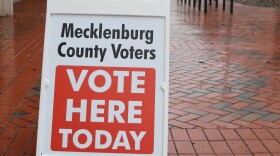North Carolina regulators have approved Duke Energy Progress’s plan to reduce what commercial rooftop solar customers get paid for electricity they send to the grid. Solar advocates say the change caught them by surprise and could make solar less attractive, especially for smaller customers.
The change is buried in a 262-page order two weeks ago from the North Carolina Utilities Commission that raises rates for Duke Energy Progress customers in the Asheville area, Raleigh and the eastern part of the state. But Duke is asking regulators for the same changes as part of a rate hike request for the rest of North Carolina.
The new lower solar rates vary based on time of day and affect new business or nonprofit customers that install rooftop solar after Oct. 1. Existing customers can keep their current plans until 2033.
Duke spokesman Randy Wheeless said it's part of Duke's effort to modernize so-called "solar net metering" payments in line with the cost of electricity.
"Probably the biggest change is that the excess energy back to our system will be compensated at a kind of a value of the electricity at that time," he said.
Wheeless also said the change is about making sure that solar customers don't get a benefit at the expense of other customers. "It's just really bringing fairness to the system," he said.
Similar changes take effect Oct. 1 for residential solar owners across the state, though existing customers can opt out until 2026.
Stew Miller, founder and president of Yes Solar Solutions in Cary, said he was surprised to learn of the changes and wishes Duke had discussed the plans in advance with solar installers and customers. That's what happened when Duke planned the changes in residential rooftop solar rates.
"I was fairly shocked, because we were one of the three companies that worked with Duke to try and come up with a transition plan for the residential net metering changes," Miller said. "During that conversation, there was no mention of any changes to commercial."
Matt Abele, interim executive director of the North Carolina Sustainable Energy Association, said his group had urged regulators to separate the commercial net metering proposal from the rate hike and hold separate hearings.
"There was not much opportunity for the collective community to weigh in on what potential options we had on the table and what customers desired, what was best for installers, and what was best for the overall clean energy economy moving forward," Abele said. "Instead, we saw Duke insert language into a rate case, and then the commission sided exactly with what Duke proposed."
Miller said he thinks most large business customers will be able to absorb the payment cuts, but he worries about small businesses and churches.
"It might force a nonprofit or a smaller entity to take a look at it and say, well, maybe this just doesn't make sense for us anymore," Miller said.
But Miller says he hopes that new federal tax rebates and other incentives will offset some of the pain.
There was something in the order for bigger customers: An increase in the maximum size of rooftop solar installations from 1 megawatt to 5 megawatts. Miller says many large businesses would like to install more solar, as they can in Virginia and other nearby states.
The state's utility consumer advocate had recommended lifting the cap entirely, but regulators rejected that idea.
Meanwhile, the new rate plan also would pay solar owners monthly, instead of posting credits on customers' bills that eventually expire. "We will compensate these businesses for their excess energy every month," he said.
Wheeless said Duke has about 1,300 nonresidential rooftop solar customers in the Carolinas.








